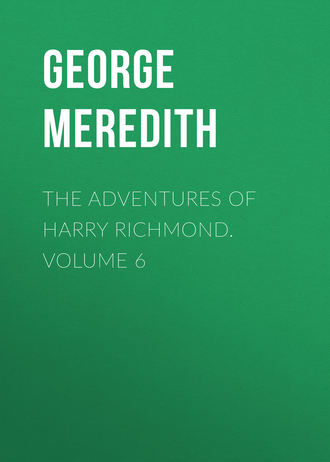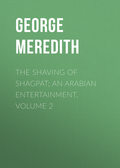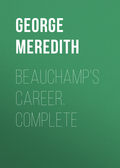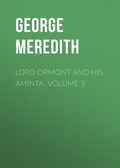
George Meredith
The Adventures of Harry Richmond. Volume 6
'Are you the Marquis of Edbury, or a drunken groom, sir?'
"Gad, old gentleman, I've half a mind to ride you down,' said Edbury, and, espying me, challenged me to a race to run down the fogies.
A cavalcade of six abreast came cantering along. I saw my father listen to a word from Lady Edbury, and push his horse to intercept the marquis. They spoke. 'Presently, presently,' my father said; 'ride to the rear, and keep at half a stone's throw-say, a groom's distance.'
'Groom be hanged!' Edbury retorted. 'I made a bet I'd drive you out of the Park, old Roy!'
'Ride behind, then,' said my father, and to my astonishment Edbury obeyed him, with laughter. Lady Edbury smiled to herself; and I experienced the esteem I perceived in her for a masterful manner. A few minutes later my father beckoned me to pay my respects to Graf Kesensky, an ambassador with strong English predilections and some influence among us. He asked me if he was right in supposing I wished to enter Parliament. I said he was, wondering at the interest a foreigner could find in it. The count stopped a quiet-pacing gentleman. Bramhaxri DeWitt joined them, and a group of friends. I was introduced to Mr. Beauchamp Hill, the Government whip, who begged me to call on him with reference to the candidature of a Sussex borough: 'that is,' said he, turning to Graf Kesensky, 'if you're sure the place is open? I've heard nothing of Falmouth's accident.' The count replied that Falmouth was his intimate friend; he had received a special report that Falmouth was dying, just as he was on the point of mounting his horse. 'We shan't have lost time,' said Mr. Hill. The Government wanted votes. I went down to the House of Commons at midnight to see him. He had then heard of Falmouth's hopeless condition, and after extracting my political views, which were for the nonce those of a happy subserviency, he expressed his belief that the new writ for the borough of Chippenden might be out, and myself seated on the Government benches, within a very short period. Nor would it be necessary, he thought, for the Government nominee to spend money: 'though that does not affect you, Mr. Richmond!' My supposed wealth gave me currency even in political circles.
CHAPTER XLIII
I BECOME ONE OF THE CHOSEN OF THE NATION
An entire revulsion in my feelings and my way of thinking was caused by this sudden change of prospect. A member of our Parliament, I could then write to Ottilia, and tell her that I had not wasted time. And it was due to my father, I confessed, when he returned from his ball at dawn, . that I should thank him for speaking to Graf Kesensky. 'Oh!' said he, 'that was our luck, Richie. I have been speaking about you to hundreds for the last six months, and now we owe it to a foreigner!' I thanked him again. He looked eminently handsome in his Henry III. costume, and was disposed to be as luxurious as his original. He had brought Count Lika, Secretary of Legation to the Austrian Embassy, dressed as an Albanian, with him. The two were stretched on couches, and discoursing of my father's reintroduction of the sedan chair to society. My father explained that he had ordered a couple of dozen of these chairs to be built on a pattern of his own. And he added, 'By the way, Richie, there will be sedaniers—porters to pay to-day. Poor men should be paid immediately.' I agreed with the monarch. Contemplating him, I became insensible to the sting of ridicule which had been shooting through me, agonizing me for the last eight-and-forty hours. Still I thought: can I never escape from the fascination?—let me only get into Parliament! The idea in me was that Parliament lifted me nearer to Ottilia, and would prompt me to resolute action, out of his tangle of glittering cobwebs. I told him of my interview with Beauchamp Hill. 'I have never known Kesensky wrong yet,' said he; 'except in his backing of Falmouth's horses.' Count Lika murmured that he hoped his Chief would be wrong in something else: he spoke significantly. My father raised his eyebrows. 'In his opinion,' Lika accepted the invitation to pursue, 'Prince Ernest will not let that announcement stand uncontradicted.'
My father's eyes dwelt on him. 'Are we accused of it?'
Lika slipped from the question. 'Who is accused of a newspaper's doings?
It is but the denial of a statement.'
'I dare them to deny it!—and, Lika, my dear fellow, light me a cigarette,' said my father.
'Then,' said Lika, touching the flame delicately, 'you take the view that
Kesensky is wrong in another thing besides horses.'
I believe he struck on the subject casually: there was nothing for him to gain or lose in it; and he had a liking for my father.
After puffing the cigarette twice or thrice my father threw it down, resuming his conversation upon the sedan, the appropriate dresses of certain of the great masquerading ladies, and an incident that appeared to charge Jorian DeWitt with having misconducted himself. The moment Lika had gone upstairs for two or three hours' sleep, he said to me: 'Richie, you and I have no time for that. We must have a man at Falmouth's house by eight o'clock. If the scrubbing-maid on all fours- not an inelegant position, I have remarked—declares him dead, we are at Bartlett's (money-lender) by ten: and in Chippenden borough before two post meridian. As I am a tactician, there is mischief! but I will turn it to my uses, as I did our poor Jorian to-night; he smuggled in the Chassediane: I led her out on my arm. Of that by and by. The point is, that from your oath in Parliament you fly to Sarkeld. I implore you now, by your love for me and the princess, not to lose precious minutes. Richie, we will press things so that you shall be in Sarkeld by the end of the month. My son! my dear boy! how you loved me once!—you do still! then follow my directions. I have a head. Ay, you think it wild? 'Tis true, my mother was a poetess. But I will convince my son as I am convincing the world-tut, tut! To avoid swelling talk, I tell you, Richie, I have my hand on the world's wheel, and now is the time for you to spring from it and gain your altitude. If you fail, my success is emptiness.'
'Will you avoid Edbury and his like, and protect yourself?' was my form of stipulation, spoken to counteract his urgency.
He gave no answer beyond a wave of the hand suitable to his princely one- coloured costume of ruffled lavender silk, and the magnificent leg he turned to front me. My senses even up to that period were so impressionable as to be swayed by a rich dress and a grand manner when circumstances were not too unfavourable. Now they seemed very favourable, for they offered me an upward path to tread. His appearance propitiated me less after he had passed through the hands of his man Tollingby, but I had again surrendered the lead to him. As to the risk of proceedings being taken against him, he laughed scornfully at the suggestion. 'They dare not. The more I dare, the less dare they.' Again I listened to his curious roundabout reasoning, which dragged humour at its heels like a comical cur, proclaiming itself imposingly, in spite of the mongrel's barking, to be prudence and common sense. Could I deny that I owed him gratitude for the things I cherished most? —for my acquaintance with Ottilia?—for his services in Germany?—for the prospect of my elevation in England? I could not; and I tried hard to be recklessly grateful. As to money, he reiterated that he could put his hand on it to satisfy the squire on the day of accounts: for the present, we must borrow. His argument upon borrowing—which I knew well, and wondered that I did not at the outset disperse with a breath of contempt—gained on me singularly when reviewed under the light of my immediate interests: it ran thus:—We have a rich or a barren future, just as we conceive it. The art of generalship in life consists in gathering your scattered supplies to suit a momentous occasion; and it is the future which is chiefly in debt to us, and adjures us for its sake to fight the fight and conquer. That man is vile and fit to be trampled on who cannot count his future in gold and victory. If, as we find, we are always in debt to the past, we should determine that the future is in our debt, and draw on it. Why let our future lie idle while we need succour? For instance, to-morrow I am to have what saves my reputation in the battle to-day; shall I not take it at once? The military commander who acts on that principle overcomes his adversary to a certainty.
'You, Richie, the member for this borough of Chippenden, have won solid ground. I guarantee it to you. And you go straight from the hustings, or the first taste of parliamentary benches, to Sarkeld: you take your grandad's proposition to Prince Ernest: you bring back the prince's acceptance to the squire. Can you hope to have a princess without a battle for her?' More and much more in this strain, until—for he could read me and most human beings swiftly on the surface, notwithstanding the pressure of his fancifulness—he perceived that talking influenced me far less than activity, and so after a hurried breakfast and an innocuous glance at the damp morning papers, we started to the money-lender's, with Jennings to lend his name. We were in Chippenden close upon the hour my father had named, bringing to the startled electors the first news of their member's death.
During the heat of the canvass for votes I received a kind letter from the squire in reply to one of mine, wherein he congratulated me on my prospects of success, and wound up: 'Glad to see it announced you are off with that princess of yours. Show them we are as proud as they are, Harry, and a fig for the whole foreign lot! Come to Riversley soon, and be happy.' What did that mean? Heriot likewise said in a letter: 'So it's over? The proud prince kicks? You will not thank me for telling you now what you know I think about it.' I appealed to my father. 'Canvass! canvass!' cried he; and he persistently baffled me. It was from Temple I learnt that on the day of our starting for Chippenden, the newspapers contained a paragraph in large print flatly denying upon authority that there was any foundation for the report of an intended marriage between the Princess of Eppenwelzen-Sarkeld and an English gentleman. Then I remembered how that morning my father had flung the papers down, complaining of their dampness.
Would such denial have appeared without Ottilia's sanction?
My father proved that I was harnessed to him; there was no stopping, no time for grieving. Pace was his specific. He dragged me the round of the voters; he gave dinners at the inn of true Liberals, and ate of them contentedly; he delivered speeches incessantly. The whole force of his. serio-comic genius was alive in its element at Chippenden. From balls and dinners, and a sharp contest to maintain his position in town, he was down among us by the first morning train, bright as Apollo, and quite the sun of the place, dazzling the independent electors and their wives, and even me somewhat; amazing me, certainly. Dettermain, his lawyer, who had never seen him in action, and supposed he would treat an election as he did his Case, with fits and starts of energy, was not less astonished, and tried to curb him.
'Mr. Dettermain, my dear sir, I apprehend it is the electoral maxim to woo the widowed borough with the tear in its eye, and I shall do so hotly, in a right masculine manner,' my father said. 'We have the start; and if we beat the enemy by nothing else we will beat him by constitution. We are the first in the field, and not to reap it is to acknowledge oneself deficient in the very first instrument with which grass was cut.'
Our difficulty all through the election was to contend with his humour. The many triumphs it won for him, both in speech and in action, turned at least the dialectics of the argument against us, and amusing, flattering, or bewildering, contributed to silence and hold us passive. Political convictions of his own, I think I may say with truth, he had none. He would have been just as powerful, after his fashion, on the Tory side, pleading for Mr. Normanton Hipperdon; more, perhaps: he would have been more in earnest. His store of political axioms was Tory; but he did remarkably well, and with no great difficulty, in confuting them to the wives of voters, to the voters themselves, and at public assemblies. Our adversary was redoubtable; a promising Opposition member, ousted from his seat in the North—a handsome man, too, which my father admitted, and wealthy, being junior partner in a City banking firm. Anna Penrhys knew him, and treacherously revealed some of the enemy's secrets, notably concerning what he termed our incorrigible turn for bribery.
'And that means,' my father said, 'that Mr. Hipperdon does not possess the art of talking to the ladies. I shall try him in repartee on the hustings. I must contrive to have our Jorian at my elbow.'
The task of getting Jorian to descend upon such a place as Chippenden worried my father more than electoral anxieties. Jorian wrote, 'My best wishes to you. Be careful of your heads. The habit of the Anglo-Saxon is to conclude his burlesques with a play of cudgels. It is his notion of freedom, and at once the exordium and peroration of his eloquence. Spare me the Sussex accent on your return.'
My father read out the sentences of this letter with admiring bursts of indignation at the sarcasms, and an evident idea that I inclined to jealousy of the force displayed.
'But we must have him,' he said; 'I do not feel myself complete without
Jorian.'
So he made dispositions for a concert to be given in Chippenden town. Jenny Chassediane was invited down to sing, and Jorian came in her wake, of course. He came to suffer tortures. She was obliging enough to transform me into her weapon of chastisement upon the poor fellow for his behaviour to her at the Ball-atrocious, I was bound to confess. On this point she hesitated just long enough to imply a doubt whether, under any circumstances, the dues of men should be considered before those of her sex, and then struck her hands together with enthusiasm for my father, who was, she observed—critical in millinery in the height of her ecstasy—the most majestic, charming, handsome Henri III. imaginable, the pride and glory of the assembly, only one degree too rosy at night for the tone of the lavender, needing a touch of French hands, and the merest trifle in want of compression about the waistband. She related that a certain Prince Henri d'Angleterre had buzzed at his ear annoyingly. 'Et Gascoigne, ou est-il?' called the King, and the Judge stepped forth to correct the obstreperous youth. The Judge was Jennings, clearly prepared by my father to foil the Prince—no other than Edbury. It was incomprehensible to me that my father should tolerate the tatter's pranks; unless, indeed, he borrowed his name to bonds of which I heard nothing.
Mademoiselle Chassediane vowed that her own dress was ravishing. She went attired as a boudoir-shepherdess or demurely-coquettish Sevres-china Ninette, such of whom Louis Quinze would chuck the chin down the deadly introductory walks of Versailles. The reason of her desiring to go was the fatal sin of curiosity, and, therefore, her sex's burden, not hers. Jorian was a Mousquetaire, with plumes and ruffles prodigious, and a hen's heart beneath his cock's feathers. 'Pourtant j'y allai. I saw your great ladies, how they carry themselves when they would amuse themselves, and, mon Dieu! Paris has done its utmost to grace their persons, and the length of their robes did the part of Providence in bestowing height upon them, parceque, vous savez, Monsieur, c'est extraordinaire comme ils ont les jambes courtes, ces Anglaises!' Our aristocracy, however, was not so bad in that respect as our bourgeoisie; yet it was easy to perceive that our female aristocracy, though they could ride, had never been drilled to walk: 'de belles femmes, oui; seulement, tenez, je n'admire ni les yeux de vache, ni de souris, ni mime ceux de verre comme ornement feminin. Avec de l'embonpoint elles font de l'effet, mais maigre il n'y a aucune illusion possible.'
This vindictive critic smarted, with cause, at the recollection of her walk out of her rooms. Jorian's audacity or infatuation quitted him immediately after he had gratified her whim. The stout Mousquetaire placed her in a corner, and enveloped her there, declaring that her petition had been that she might come to see, not to be seen,—as if, she cried out tearfully, the two wishes must not necessarily exist together, like the masculine and the feminine in this world! Prince Hal, acting the most profligate period of his career, espied her behind the Mousquetaire's moustache, and did not fail to make much of his discovery. In a perilous moment for the reputation of the Ball, my father handed him over to Gascoigne, and conducted Jenny in a leisurely walk on his arm out of the rooms.
'Il est comme les Romains,' she said: 'he never despairs of himself.
It is a Jupiter! If he must punish you he confers a dignity in doing it.
Now I comprehend, that with such women as these grandes dames Anglaises
I should have done him harm but for his greatness of soul.'
Some harm, I fancied, must have been done, in spite of his boast to the contrary. He had to be in London every other night, and there were tales current of intrigues against him which had their sources from very lofty regions. But in Chippenden he threw off London, just as lightly as in London he discarded Chippenden. No symptom of personal discouragement, or of fatigue, was betrayed in his face. I spoke once of that paragraph purporting to emanate from Prince Ernest.
'It may,' he said. 'Business! Richie.'
He set to counting the promises of votes, disdaining fears and reflections. Concerts, cricket-matches, Balls, dinner-parties, and the round of the canvass, and speech-making at our gatherings, occupied every minute of my time, except on Saturday evenings, when I rode over to Riversley with Temple to spend the Sunday. Temple, always willing to play second to me, and a trifle melancholy under his partial eclipse- which, perhaps, suggested the loss of Janet to him—would have it that this election was one of the realizations of our boyish dreams of greatness. The ladies were working rosettes for me. My aunt Dorothy talked very anxiously about the day appointed by my father to repay the large sum expended. All hung upon that day, she said, speaking from her knowledge of the squire. She was moved to an extreme distress by the subject.
'He is confident, Harry; but where can he obtain the money? If your grandfather sees it invested in your name in Government securities, he will be satisfied, not otherwise: nothing less will satisfy him; and if that is not done, he will join you and your father together in his mind; and as he has hitherto treated one he will treat both. I know him. He is just, to the extent of his vision; but he will not be able to separate you. He is aware that your father has not restricted his expenses since they met; he will say you should have used your influence.'
She insisted on this, until the tears streamed from her eyes, telling me that my grandfather was the most upright and unsuspicious of men, and precisely on that account the severest when he thought he had been deceived. The fair chances of my election did not console her, as it did me, by dazzling me. She affirmed strongly that she was sure my father expected success at the election to be equivalent to the promised restitution of the money, and begged me to warn him that nothing short of the sum squandered would be deemed sufficient at Riversley. My dear aunt, good woman though she was, seemed to me to be waxing miserly. The squire had given her the name of Parsimony; she had vexed him, Janet told me, by subscribing a miserable sum to a sailors' asylum that he patronized—a sum he was ashamed to see standing as the gift of a Beltham; and she had stopped the building of a wing of her village school-house, designed upon his plan. Altogether, she was fretful and distressful; she appeared to think that I could have kept my father in better order. Riversley was hearing new and strange reports of him. But how could I at Chippenden thwart his proceedings in London? Besides, he was serving me indefatigably.
It can easily be imagined what description of banter he had to meet and foil.
'This gentleman is obliging enough to ask me, "How about the Royal Arms?" If in his extreme consideration he means to indicate my Arms, I will inform him that they are open to him; he shall find entertainment for man and beast; so he is doubly assured of a welcome.'
Questioned whether he did not think he was entitled to be rated at the value of half-a-crown, he protested that whatever might be the sum of his worth, he was pure coin, of which neither party in Chippenden could accuse the silver of rubbing off; and he offered forthwith an impromptu apologue of a copper penny that passed itself off for a crown-piece, and deceived a portion of the country: that was why (with a wave of the arm over the Hipperdon faction) it had a certain number of backers; for everybody on whom the counterfeit had been foisted, praised it to keep it in the currency.
'Now, gentlemen, I apprehend that Chippenden is not the pocket-borough for Hipperdon coin. Back with him to the Mint! and, with your permission, we will confiscate the first syllable of his name, while we consign him to oblivion, with a hip, hip, hip, hurrah for Richmond!'
The cheers responded thunderingly, and were as loud when he answered a 'How 'bout the Dauphin?' by saying that it was the Tory hotel, of which he knew nothing.
'A cheer for old Roy!' Edbury sang out.
My father checked the roar, and turned to him.
'Marquis of Edbury, come to the front!'
Edbury declined to budge, but the fellows round him edged aside to show him a mark for my father's finger.
'Gentlemen, this is the young Marquis of Edbury, a member of the House of Lords by right of his birth, born to legislate for you and me. He, gentlemen, makes our laws. Examine him, hear him, meditate on him.'
He paused cruelly for Edbury to open his mouth. The young lord looked confounded, and from that moment behaved becomingly.
'He might have been doing mischief to-morrow,' my father said to me, and by letting me conceive his adroitness a matter of design, comforted me with proofs of intelligent power, and made me feel less the melancholy conjunction of a piece of mechanism and a piece of criticism, which I was fast growing to be in the contemplation of the agencies leading to honour in our land. Edbury whipped his four-in-hand to conduct our voters to the poll. We had to pull hard against Tory interest. It was a sharp, dubious, hot day—a day of outcries against undue influence and against bribery—a day of beer and cheers and the insanest of tricks to cheat the polling-booth. Old John Thresher of Dipwell, and Farmer Eckerthy drove over to Chippenden to afford me aid and countenance, disconcerting me by the sight of them, for I associated them with Janet rather than with Ottilia, and it was to Ottilia that I should have felt myself rising when the figures increased their pace in my favour, and the yeasty mob surrounding my father's superb four-horsed chariot responded to his orations by proclaiming me victor.
'I congratulate you, Mr. Richmond,' Dettermain said. 'Up to this day I have had my fears that we should haul more moonshine than fish in our net. Your father has accomplished prodigies.'
My father, with the bloom of success on his face, led me aside soon after a safe majority of upwards of seventy had been officially announced. 'Now, Richie,' said he, 'you are a Member. Now to the squire away! Thank the multitude and off, and as quick to Sarkeld as you well can, and tell the squire from me that I pardon his suspicions. I have landed you a Member—that will satisfy him. I am willing, tell him . . . you know me competent to direct mines . . . bailiff of his estates— whatever he pleases, to effect a reconciliation. I must be in London to- night—I am in the thick of the fray there. No matter: go, my son.' He embraced me. It was not a moment for me to catechize him, though I could see that he was utterly deluded.
Between moonlight and morning, riding with Temple and Captain Bulsted on either side of me, I drew rein under the red Grange windows, tired, and in love with its air of sleepy grandeur. Janet's window was open. I hailed her. 'Has he won?' she sang out in the dark of her room, as though the cry of delight came upon the leap from bed. She was dressed. She had commissioned Farmer Eckerthy to bring her the news at any hour of the night. Seeing me, she clapped hands. 'Harry, I congratulate you a thousand times.' She had wit to guess that I should never have thought of coming had I not been the winner. I could just discern the curve and roll of her famed thick brown hair in the happy shrug of her shoulder, and imagined the full stream of it as she leaned out of window to talk to us.
Janet herself, unfastened the hall-door bolts. She caressed the horses, feverishly exulting, with charming subdued laughter of victory and welcome, and amused us by leading my horse round to stables, and whistling for one of the lads, playing what may, now and then, be a pretty feature in a young woman of character—the fair tom-boy girl. She and her maid prepared coffee and toast for us, and entered the hall, one after the other, laden with dishes of cold meat; and not until the captain had eaten well did she tell him slyly that somebody, whom she had brought to Riversley yesterday, was abed and asleep upstairs. The slyness and its sisterly innocence lit up our eyes, and our hearts laughed. Her cheeks were deliciously overcoloured. We stole I know not what from the night and the day, and conventional circumstances, and rallied Captain Bulsted, and behaved as decorous people who treat the night properly, and live by rule, do not quite do. Never since Janet was a girl had I seen her so spirited and responsive: the womanly armour of half-reserve was put away. We chatted with a fresh-hearted natural young creature who forfeited not a particle of her ladyship while she made herself our comrade in talk and frolic.
Janet and I walked part of the way to the station with Temple, who had to catch an early train, and returning—the song of skylarks covering us— joined hands, having our choice between nothing to say, and the excess; perilous both.







